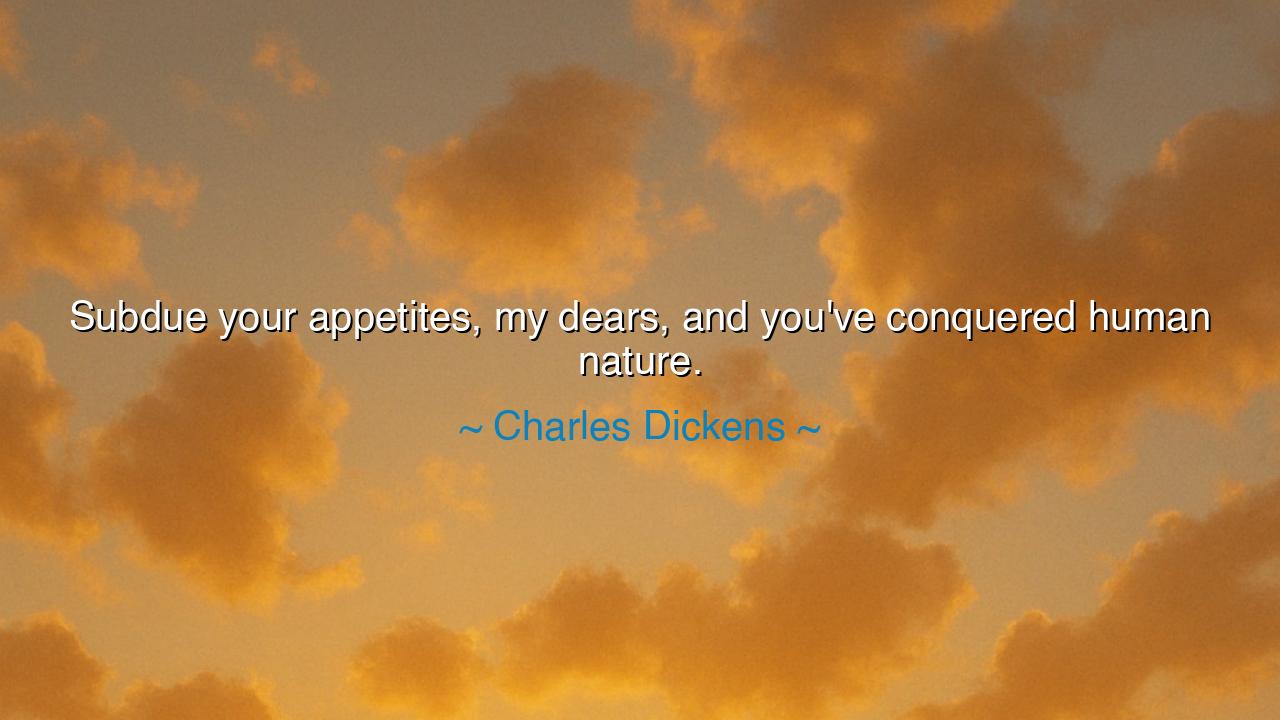
Subdue your appetites, my dears, and you've conquered human






The great novelist Charles Dickens, whose pen cut deeply into the follies and virtues of mankind, once gave this counsel: “Subdue your appetites, my dears, and you’ve conquered human nature.” In this short admonition lies a wisdom that reaches back to the ancients, for he speaks not merely of food and drink, but of all the cravings that pull at the soul—desire for wealth, hunger for power, thirst for pleasure, and the restless demand for more. To conquer these is to stand above the tempest of the flesh; to fail is to be tossed endlessly upon its waves.
To subdue the appetites is no small task. Appetite is the raw voice of nature within us, urging survival, comfort, and pleasure. It is necessary, for without appetite man would not eat, drink, or seek shelter. But left ungoverned, it swells into gluttony, greed, lust, or vanity. Dickens understood that the truest strength is not found in indulging every desire, but in mastering them. For a man who can rule his own impulses has no master, while one who is ruled by them is forever enslaved.
History gives us countless mirrors of this truth. Consider Alexander the Great, who conquered half the known world yet could not conquer his own appetites—his temper, his drinking, his need for glory—and so his empire crumbled at his death. Contrast him with Marcus Aurelius, the Stoic emperor, who taught himself restraint and self-command, and whose writings still shine as a beacon of disciplined wisdom. Both were rulers of nations, but only one was a ruler of himself. Dickens’ counsel echoes in these lives: it is not the conquest of kingdoms, but the conquest of appetite, that marks true mastery.
Even in the realm of ordinary men and women, the principle stands. The monks and ascetics of old sought holiness not by adding to their lives, but by stripping away indulgence, learning the joy of simplicity. Their power was not in wealth or armies, but in the serenity that comes when one is no longer a slave to cravings. In modern times, we see the same in the lives of those who practice discipline—athletes, scholars, reformers—each achieving greatness not by yielding to ease, but by mastering desire.
The phrase “you’ve conquered human nature” reveals the depth of Dickens’ insight. For human nature, left ungoverned, is restless, insatiable, and unruly. Yet when the appetites are subdued, human nature is not destroyed but elevated. The energy once wasted on indulgence is transformed into creativity, compassion, endurance, and vision. Thus, the true conquest is not repression but redirection: turning the fire of desire into light that guides rather than flame that consumes.
The lesson for us is clear: if you would be strong, master yourself first. The world is filled with men who command others yet cannot command their own tongues, their own stomachs, their own lusts. Do not be like them. Begin with small victories: restrain one indulgence, silence one complaint, redirect one craving into something noble. Over time, these victories accumulate into character, and character into destiny.
Practically, this means practicing moderation in daily life—eating and drinking with temperance, using wealth with purpose rather than waste, pursuing pleasure without letting it enslave you. It means pausing before each indulgence and asking: does this strengthen me, or weaken me? Does this lead to freedom, or to bondage? To live with such questions is to live consciously, and to grow stronger with every answer.
Thus, Dickens’ words resound not as a stern command but as a loving exhortation: “My dears, subdue your appetites.” For in doing so, you will discover the greatest victory of all—the conquest of yourself. And he who conquers himself, as the ancients knew, is greater than he who takes a city, for his triumph is eternal and cannot be taken from him.






AAdministratorAdministrator
Welcome, honored guests. Please leave a comment, we will respond soon